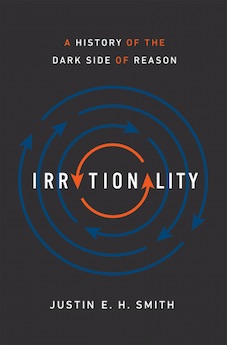By Louis J. Kern
This volume’s frontispiece, Goya’s etching El Sueño de la Razón Produce Monstruos (1799—“The Sleep of Reason Generates Monsters”), seemingly endorses the Enlightenment enthronement of reason as capable of overcoming human error and banishing the darkness of ignorance by promoting the light of truth. Traditionally, reason has been considered the bearer of civilization and the instrumentality of modernization and progress as opposed to irrationality the source of barbarism, superstition, and regression. In a wide-ranging, closely-argued philosophical consideration of the role of reason in human thought, Justin E. H. Smith demonstrates that the binary construction reason-irrationality is seriously flawed. Any attempt to establish a permanent rational order is chimerical since seeking to impose rationality leads either to reactionary irrationalism or the attempt to impose reason by force—utopianism or authoritarianism. Historically, he finds that most periods have been governed by irrationality.
While the relationship between the two is clearly dialectical, Smith denominates them the “twin poles of human history,” and his argument eloquently demonstrates that depending on social perspective and cultural circumstances one can easily assume the guise of the other. He examines a broad spectrum of irrational modes of thought ranging from creationism to flat earth theory, from cult affiliation to Tumpian politics, and from the anti-vaccination movement to racism, and critiques political correctness and excesses of social media. Rationality, he argues, is fatally flawed, assuming that its values are universally applicable and judging all opposition to be ignorant and irrational. Irrationality, on the other hand, resists rational imposition and expertise, and embraces pseudo-science as a form of phenomenological as opposed to empiric thought.
Despite its noxious, unscientific nature, racism has been historically coded as rational by dominant groups in a variety of societies. Reason, Smith believes can only mitigate but never totally eliminate racism because it is sustained by pervasive confirmation bias. In the United States whiteness assumes that blackness encodes physicality, ignorance, stupidity, and lack of reflection and planning. Given the power of whiteness expressed as segregation and ghettoization, rationalized racism becomes a self-fulfilling prophecy. From the perspective of blackness, restricted opportunities and limitations on mobility and police brutality in the service of rational order ensure that the irrationality expressed in gang behavior, pursuit of immediate pleasure over education and long-term planning, and rebellious acts of destruction are a perfectly rational response.
The rational/irrational dynamic of the anti-vaccination movement presents a similar case. It is rooted in distrust of expertise and government oversight. For many, routine lack of medical care and the exploitation of the pharmaceutical industry neither of which has shown any serious concern for their health reinforces their resistance to the imposition by those same authorities of inoculation. One man’s irrationality, it seems, is another’s rationality.
History, entangling fact and myth, subserves irrationality, particularly in the U.S. where public education fails to train students as well-informed citizens. This failure undergirds “Trumpian dreamtime . . . the primordial era in which the regularities of the present world did not hold, everything was ‘great.’’ Ultimately, Smith finds Trump “ratcheting up of irrationality to levels unprecedented in recent history.”
Like Goya, who added to the epigram of his etching “united with her (reason) she (fantasy, dream) is the mother of the arts and source of their wonders,” Smith argues that certain forms of irrationality—social disorder, carnival, revelry are healthy insofar as they are not pushed to excess or used to further suppression. In any case, irrationality is ineradicable and rationality itself too easily bleeds into irrationality. In the end we are “human, all too human, we err and falter, but flawed as we are we must do the best we can.
Louis J. Kern (ΦBK, Clark University) is professor emeritus of history at Hofstra University. Hofstra University is home to the Omega of New York chapter of Phi Beta Kappa.




